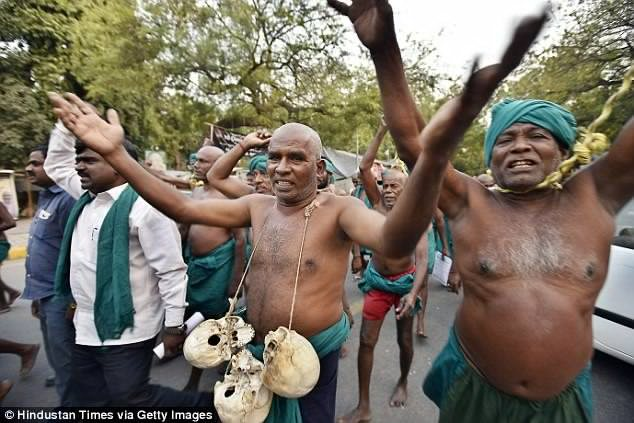Indian Farmers Stage Protest With Human Skulls And Rats In Their Mouths
Indian farmers stage protest with human skulls and rats in their mouths in Delhi on Monday calling on Prime Minister Narendra Modi to save them from starvation. It’s understood that the Indian farmers hit by drought and debt travelled to the Indian capital from the southern state of Tamil Nadu to complain about the lack of rains over the last year. The situation forced many of them into taking loans from banks and moneylenders to survive.

P. Ayyakannu, the president of South Indian Rivers Linking Farmers Association, who was sitting by a row of eight human skulls said:
“These skulls are all that remains of our brothers who killed themselves because they could not repay their debts”.

“It has come to the stage where hundreds of farmers are committing suicide due to the pressure of not being able to repay these loans, yet our prime minister is doing very little. We are here to demand Modi help us and write-off these debts.”
Since Modi came into power almost three years ago, a national crop damage insurance scheme has been introduced with the promise to improve irrigation and input subsidies to farmers if a third of their crop is damaged.

However, acccording to the farmers’ unions, the implementation of these measures is slow.
Hence, over 100 farmers dressed in green turbans and loin cloths sat bare-chested on the roadside chanting slogans and sharing stories of watching their rice and cotton crops wither away. Some even held up large white rats and placed the squirming rodents between their teeth threatening they would eat them to avoid starvation.
“This is not just about the farmers in Tamil Nadu, but about farmers all over India. We are all facing the same problems,” said Rakesh Tikait, president of the Bhartiya Kisan Union, a union representing thousands of farmers in northern India.
“We want the government to write-off all our loans, introduce a profitable prices for all agricultural products, and provide proper compensation for crop losses due to the drought.”









